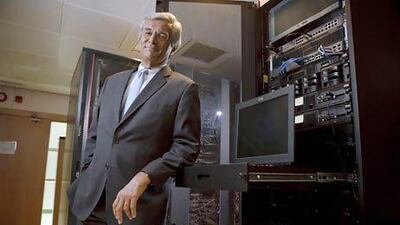Cesare Cardone has been the chief executive of Gulf Business Machines since 2001, providing IT hardware and services across the Middle East. The Italian spent almost 25 years with IBM in Italy, the United States and France before joining GBM. He talks about changes and challenges in the industry.
You have been in Dubai for more than a decade. You must have seen some big changes.
I came here in 2000 and it has changed dramatically. The level of complexity, of sophistication of the customer and of the country is completely different. Things can change very rapidly here. Back in London, if they don't like the management, it takes time to change. Here, a bank, if they want to change it completely then it's seven expats out, seven expats in. So, in six months the bank is completely different. And this does not happen in any other place in the world. This company was established 23 years ago and we represent the mayor players in the IT industry. In the booming days, [rival] companies were starting up but by then we were quite well established.
How do you see the industry changing?
The cloud is the most relevant challenge for the industry in the next five to 10 years. It's an enormous challenge for companies like Cisco, IBM, Microsoft. They are used to a certain model: selling technology to customers [and] trying to maximise the added value and the margin. The cloud is commoditising a lot of the elements - the traditional hardware, software, networks. But how this will play out nobody knows. When you are in technology you are confronted by emerging things; it was the same five years ago, 10 years ago.
What challenges do you see associated with these changes?
IT has become very pervasive. Before, it was a minority that knew what it is. Now you have the feeling how technology can change your life or your profession. There are two challenges that are enormous. Today, even a small customer cannot afford not to have IT that is up and running every day. The vast majority of companies are medium-sized companies and to keep the infrastructure up and running is not easy. You have an administrator and if this guy is sick you are in big trouble. And security: you can never fix it [entirely] but you need to work to reduce the risk. It depends on how much you want to spend and the risk you are able to take.
You have quite a diverse group of employees. Is managing a company with so many nationalities a challenge?
We have more than 1,000 employees. Most of the companies here, not only in IT, they [hire] Indians, Pakistanis, Egyptians, Lebanese. This company historically - and I did not change this but I continued to reinforce this - we are all possible nationalities. There is no one predominant nationality, which is a major strength. Directly reporting to me I have two Australians, an Italian, two Indians, two Bahrainis, a Jordanian, a Lebanese. I never had any tension associated with a political situation. We make sure people feel they are treated fairly. And customers, some want to deal with British, with Lebanese, with Indians. You tell me [who you want] and I can make it work. I think in IT we are the only company that has this variety.
